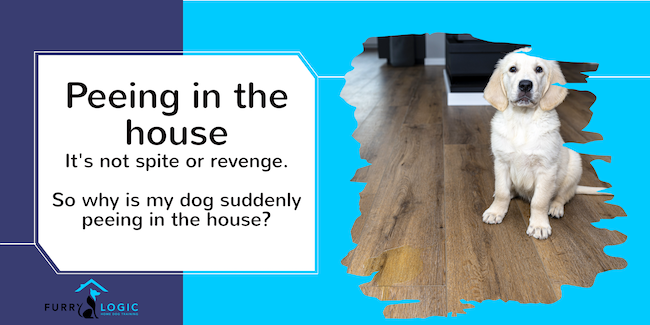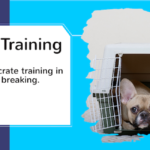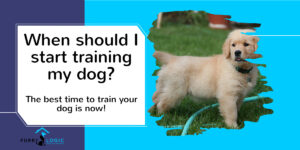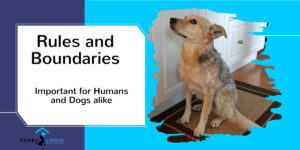Dogs do not eliminate in the wrong place out of spite or to get revenge. It is improper training that leads to mistakes. So never punish a puppy or dog after the fact.
– Furry Logic Dog Training

If your dog is peeing in the house all of a sudden, it could be due to several causes, none of which are spite or revenge.
Dogs don’t have a spiteful bone in their bodies! They live in the moment and behaviourally, a dog doesn’t want to pee where he lives, eats or sleeps. If you’re wondering if your dog is peeing in the house ‘for attention’, it’s time to investigate some of the reasons why your dog might pee in the house and how to fix the problem.
Here are 5 reasons your dog might pee in the house:
He’s just a puppy!
On average, it takes puppies up to 16 weeks to learn bladder control.
It takes time to strengthen those muscles and before the age of 12 weeks, it’s just unrealistic to expect zero accidents in the home. A good rule of thumb to estimate how long your puppy can hold his urine is by taking his age, in months, and adding one and this will give you the number of hours you could possibly expect he’d be able to wait to go for a pee. This can vary based on breed and size, but it’s a good place to start.
As we mentioned in another blog post, puppy housebreaking is an intensive process when you bring your new furry friend home. It’s so intensive that you may even (in the first few weeks) need to set an alarm in the night every few hours to get up and take your puppy out for a pee. The most common issue we hear about is that ‘my dog is peeing in the house at night.’ This happens most often with puppies who just don’t have bladder control yet.
The AKC provides some great tips for housebreaking your puppy so he doesn’t pee in the house along with our thoughts on the matter:
- Use a kennel or a crate – dogs don’t like to mess where they sleep. The pack mentality means they like to protect themselves from predators and urine is an attractant for predators. The kennel serves many purposes which we’ve discussed in other articles, and should be available to your puppy at all times as their safe-haven. If you’ve chosen a kennel that’s going to be suitable for his large breed, adult size, you’ll want to consider filling up some of that extra space with a partition or shoe boxes. Your crate needs to be only large enough for him to stand up, turn around and lie down in the beginning. If there’s room to maneuver, then there’s room to “pee in a corner” and it will defeat your efforts to house train.
- Use puppy training pads – these pads are scented with an attractant to teach puppies the correct place to urinate. Start by plastering the entire floor of his enclosed pen area with pads, gradually taking a few away each day to make the “correct area” smaller and smaller until you’re down to one pee pad. During the next phase of training, you’ll gradually move the single pee pad closer and closer to the door you’d like them to use to go outside and eventually put the pad just outside the door where they can see it and they’ll “ask” to go out to get to it.
- Supervise your puppy at all times – you’ll be able to see the signs that he’s “gotta go!” The sniffing, the circling, the restless wandering are all body language that happen particularly after eating, playing, sleeping, napping or drinking that can give clues to when your puppy needs to go outside. When you’re outside, consider having him on a leash so you can keep him in sight.
- Go with him and be patient – When you set the alarm and take him outside, it might not be instant (which is a real bummer in the winter!) so you’ll need to be patient and wait and watch until he goes. It seems silly that you need to “hold his hand” while he goes to the bathroom, but you need to be there to catch him in the act! You might consider bringing a pee pad or a “pee post” along to show him exactly where you’d like him to go to the bathroom. This is a way for us to take advantage of their biological imperative that happens when they smell a specific pheromone and use it as a tool for training.
- Give positive reinforcement – Yes, we do give participation trophies in house training for puppies! When you have been patient and caught him in the act, in the moment, immediately PRAISE, PRAISE, PRAISE your pup for going in the right place. A half dozen of these ‘participation trophies’ is all it’s going to take for your puppy to clue in that this is a desired behavior and he will WANT to pee outside all the time.
Be consistent and handle accidents calmly – Dogs do not eliminate in the wrong place out of spite or to get revenge. It is improper training that leads to mistakes. So never punish a puppy or dog after the fact. Dogs live in the moment. The ideal teaching moment is when the dog’s body language is saying “I need to go to the bathroom.” Interrupt the behaviour and move him to the right location.
Health Issues
Especially if you see signs or traces of blood in the urine, there could be several possible issues and your vet is the best person to help you rule out any serious problems.
If your dog has recently begun peeing in the house, even though they’ve been perfectly house broken for years, it could be a sign that there’s something going on with their health and it’s probably time to have a visit with your veterinarian.
If your dog is peeing in the house all of a sudden and you see any hint of blood in the urine, there could be several potential causes and your vet is the best person to help you rule out any serious issues.
Things such as bladder infections, injuries, kidney problems, diabetes or simply old age can cause incontinence in dogs. It’s important to seek veterinary advice if you suspect any health issues. UTI’s (yes, they get them too!) are one of the most common reasons a dog will regress to peeing in the house again.
Your vet can suggest the right medical testing and treatment options to help clear up the problem. Once health issues are fixed or ruled out, you can examine other potential problems causing your dog to suddenly start peeing in the house again.
Other dogs have gone there (I must too!)
Your dog’s nose knows!
Ever taken Fido for a walk and he has to stop – At every. Single. Lamp post. And. Pee! This is because there is a pheromone present in dog urine that he can smell and we can’t.
Dogs mark their territory by urinating on objects in their perceived territory to let others know, “hey, this is my place!” Other dogs come along and disagree, marking it for themselves. It’s a silly contest with no winners!
Biologically, puppies and dogs are hardwired that when they smell this specific pheromone that’s present in urine, it causes them to HAVE to go pee!
During house training, we can take advantage of that biological imperative and use pheromone-treated pee pads and attractant sprays to encourage our puppy to “go in the right place”.
On a walk, this pheromone is why they are stopping and sniffing every single thing at leg-lifting height! Their nose absolutely detects when another dog has been there and their brain reacts to that biological imperative, telling them to lift a leg (or squat, as the case may be) and leave their pheromones behind.
If your dog is older and was previously house trained and you’ve recently moved into a new home or gotten another dog, chances are pretty good that if your dog is suddenly peeing in the house, it’s because he can smell the pheromones present, even after cleaning, of another dog’s urine. In order to rid those scents which they can smell and we can’t, it’s important to use some type of enzyme cleaner in order to “eat up” the pheromones left behind.
Change in Household
Dogs are sensitive creatures.
Sometimes, family dynamics change in a home and can cause a once-trained dog to start peeing in the house. This regression in housebreaking can be a real heartbreaking situation. Perhaps their favorite human left to go off to college or university, there was a divorce or even just a change of address can cause a once housebroken dog to need to “go back to school” himself and relearn the rules of where it’s ok to urinate.
If you’ve moved to a new home, this is where previous kennel or crate training will really help. Make sure your dog’s safe haven doggie den is available and ensure he’s safely put in the kennel for the night so there’s no accidents after bed time. You can mark the spot you’d like him to go in the yard by using a pee post or attractant spray and going with him to be able to catch him in the act and praise him when he does go where he is supposed to. These back to basics practices will hopefully have him going in the right place again in no time.
If he’s lost his favorite human due to family dynamics changes, you may want to look at finding alternatives such as a new stuffed toy (that’s been wrapped in the t-shirt of their favorite human for a few days) or replacing (as best you can) the activities they used to do together with new ones such as an extra walk or 10 extra minutes of play time. As we always stress, it’s important to disrupt the unwanted behaviour and replace it with the desired behaviour.
If you once worked from home (a.k.a. you were always available when he had to go) and you’ve changed jobs, it’s possible that he’s getting less frequent trips outdoors now and because of this, he may have started peeing in the house again. You’ll need to work on strengthening his bladder control and the length of time he can hold his urine. You might need to plan to zip home for some lunch breaks to let him out or perhaps call on a friend to come let him out during the day while you’re away.
Regardless of the reason why he’s begun peeing in the house again, it will be important to clean up the accidents really well with some type of enzymatic cleaner that will get rid of those pheromones which tell him it’s ok to go there. One of our favorites is ez-clean, an Alberta made product that cleans up all manner of smelly things.
Fear or behavioural illness
Is it time to seek professional help?
Things such as anxiety, frustration or fear can cause undesirable behaviours in our dogs such as urinating in the house.
It could be, unbeknownst to you, that there’s a new dog in the neighbourhood that’s been barking a couple doors down while you’re away at work. Maybe a new dog is getting walked past your front window in the street each day and your dog becomes overly excited and urinates. A nanny cam might help you determine the root cause so you can take the appropriate action to solve the problem.
One of those family dynamic changes mentioned above might have your dog feeling stressed or anxious. Your dog may be looking for its leader in the pack and feeling frustrated and urinating in the home again as a result. You’ll need to provide that leadership to your pet and re-train him about the proper place to go.
If you’ve tried retraining your dog to pee in the correct place and it’s just not working, it might be time to look into professional help from a behaviour therapist who specializes in this kind of problem. Dog training for anxiety and fear can be a challenging task for many owners, but we can help.
Furry Logic Dog Training can help you assess the situation and offer customized solutions and guidance to help you with your dog peeing in the house (among other things!) You can know that you’ll have our full support whenever you need it. Find a dog training appointment today in Calgary and area.







No comment yet, add your voice below!